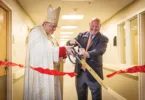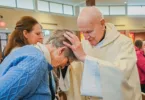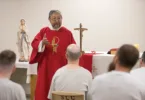Archbishop Naumann testifies in Topeka against the proposed Kansas Illegal Immigration Relief Act
Editor’s note: The following is testimony Archbishop Joseph F. Naumann gave in Topeka on March 4 to the Senate and Federal State Affairs Committee in opposition to Senate Bill 458 .
Chairman Brungardt and Members of the Committee:
Thank you for the opportunity to testify in opposition to S.B. 458, the proposed “Kansas Illegal Immigration Relief Act.” I am Archbishop Joseph F. Naumann, D.D., of the Archdiocese of Kansas City in Kansas, serving the northeastern quadrant of the state, the metropolitan archbishop for the ecclesiastical province of Kansas, and the chairman of the Kansas Catholic Conference, the organization of our church charged with the responsibility of advocating for public policies that respect fundamental human rights and promote the common good.
The Catholic Church in Kansas has a long history of being a clear voice for the rights of those without a voice: the unborn, the poor, the marginalized, and, today in particular, the immigrant. Our church shares the frustration of everyone in this room that our federal government has been unable to fix a failed immigration policy. We understand the fear and anxiety that this broken immigration policy engenders in the hearts of many Kansans.
It is our hope that those charged with leading the government of our state will not respond to these fears and anxieties by enacting legislation that will make a bad situation only worse. We believe that the enforcement only approach of S.B. 458 will not have the desired effects, but will increase the burdens on those charged with law enforcement responsibilities, result in havoc for many businesses, foster desperation in the immigrant community, create an even greater underground economy, and place families and innocent children at risk.
Post Sept. 11, 2001, we are all painfully aware of the need to protect and control our borders from those who would enter our country to harm us. There is universal agreement that we should deport documented or undocumented immigrants who engage in drug trafficking, gang violence or other illegal activities. Yet, we diminish the ability of homeland security and local law enforcement to protect us from real dangers if we force them to spend precious material and human resources to hunt down those who have come to our country to pursue the American dream of working hard to improve oneself and provide for the basic needs of one’s family.
A great Kansan, the late President Dwight David Eisenhower, at another moment in history when there were also very serious national security threats is reported to have said: “We will bankrupt ourselves in the vain search for absolute security.” Let us not squander our resources fighting those who are not our enemies but who desire to contribute to America’s vitality. Some of the proponents of legislation, which focuses exclusively on punitive measures, have referred to undocumented immigrants as invaders. If so, this is the strangest invasion in history where the invaders clean our houses, harvest our crops, care for our lawns and do many of the jobs that are considered less than desirable.
S.B. 458, in addition to placing more burdens on local law enforcement, cuts off the immigrant community from police protection by making state and local authorities enforce federal immigration rules. Forcing local police to assume an adversarial role with the immigrant community will threaten the safety of our neighborhoods and cities.
S.B. 458 also takes away an educational opportunity from immigrant children by rescinding the in-state tuition benefit that this Legislature enacted in 2004. Why would we want to deprive a young man or woman from the opportunity to develop their skills and abilities so that they will be a productive and contributing member of our society? Is it really better to have our youth hanging out on our streets with little hope for the future than in our classrooms gaining the knowledge and skills that will enable them to be productive?
I have been impressed by the members of the Kansas Legislature who make great personal sacrifices to serve the people of this state. It is my impression that the members of the Kansas General Assembly have undertaken the arduous task of running for elective office, not for financial gain or public acclaim, but because of your desire to help solve problems that threaten the common good. I believe that there is the talent in the Kansas Legislature to develop policies that can be a model for an effective reform of our current immigration policies. We need something quite different from S.B. 458 that only mimics the unsuccessful legislation of other states.
A forward-thinking immigration policy would create a pathway for undocumented immigrants to earn legal status so that they would no longer be vulnerable to unscrupulous employers and would not be forced to work for low wages, creating unfair competition to other American workers. An effective immigration policy reform would establish a fair and much more generous process for entering our nation legally. Such reform could require immigrants to work at gaining a proficiency in English as well as knowledge of American civics. It might include, as part of the pathway to legal status, the imposition of fines — commensurate with the offense — for undocumented immigrants who are willing to work hard, pay taxes and are already contributing to the overall well-being of our society.
Mike Farmer, the late executive director for the Kansas Catholic Conference, as well as an esteemed former member of this Legislature, spent his last days in this world developing ideas for what he termed a Kansas Model Immigration Plan. He believed in the goodness and wisdom of the members of this General Assembly and their ability and ingenuity to develop a practical immigration plan that addresses the real problems as well as respects the dignity and rights of both the natives and the immigrants of this great state.
The fundamental premise of Catholic social teaching is the innate dignity of the human person, that is not dependent on their stage of development, age, race, sex, or place of birth. This is not a principle that requires belief in Jesus or in his Gospel, but is part of the natural law and accessible to everyone through reason. This same underlying principle can be found in the Declaration of Independence where it speaks of inalienable rights that the state does not have the authority to give or to deny, but has the obligation to protect.
Part of the genius of the American experiment has been the openness of our nation to welcome people coming from other lands who share our yearning for freedom and to provide the opportunity to improve themselves through hard work. With the exception of the Native American population, our nation is a nation of immigrants and descendents of immigrants. I dare say that many of us in this room today have ancestors who stowed away on ships leaving Europe in the hope of a better future. It has been the positive contribution of successive generations of immigrants that has continually renewed and revitalized our nation.
In closing, I ask that you ponder the concluding paragraph contained in the attached joint letter signed by the four Catholic bishops of Kansas along with the bishops of the United Methodist Church, Kansas Area; the Central States Synod of the Evangelical Lutheran Church in America; the Episcopal Diocese of Kansas; and the Episcopal Diocese of Western Kansas:
“We ask our parishioners, other Christians, all people of faith, and all people of good will to resist fear, seize hold of hope, make justice our aim so that all living in Kansas may work together for the good and welfare of one another and not pit one against another. May we live out our Kansas neighborliness that is at the heart of the message of Jesus!”
Thank you for listening to the concerns that, I believe, are shared by many of your constituents. I will pray for wisdom for you and your colleagues as you strive to find solutions that truly protect all who call Kansas home — policies that are both humane in the treatment of the immigrant and truly work for the best interest of all Kansans. Thank you and God bless!






